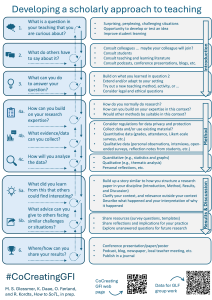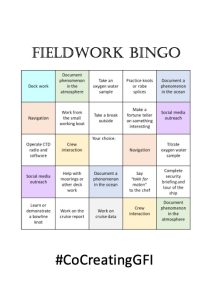We have developed a set of postcards to share our experiences with co-creation with other teachers and students — to invite discussions and inspire them to adapt the ideas for their own purposes.
Download pdf or pptx files below if you would like to use them, and get in touch with us if you have comments, suggestions, feedback!
Developing a scholarly approach to teaching
Handout for GeoLearning Forum 2025
About #CoCreatingGFI
#CoCreatingGFI is a HK-dir-funded project where students and staff at the Geophysical Institute, University of Bergen, Norway, work towards climbing the steps towards co-creating learning and teaching. Here are some examples of methods and learning activities, and ideas for sharing responsibility for learning. (Pdf for download here)
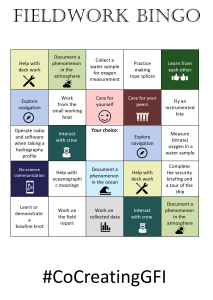 Use bingo cards in learning situations
Use bingo cards in learning situations
By equipping students with an activity bingo, they can cover a range of activities that are encouraged, but not necessarily obvious for students to take part in. Bingo can for example be used for fieldwork, laboratory experiments and procedures, learning programming, or other sets of useful skills and competences.
Read more about how to use bingos in teaching here: Glessmer, M.S., L. Latuta, F. Saltalamacchia, and K. Daae. 2023. Activity bingo: Nudging students to make the most out of fieldwork. Oceanography, https://doi.org/10.5670/oceanog.2023.217
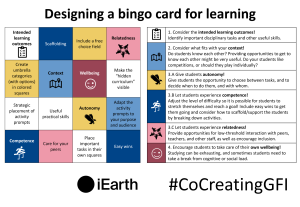 Design a bingo to make the most out of learning opportunities
Design a bingo to make the most out of learning opportunities
By equipping students with an activity bingo, they can cover a range of useful learning activities that are encouraged, but not necessarily obvious for students to take part in during, e.g., field work, laboratory courses, and programming courses. Here, the colored fields are categories, where students can choose from a larger list.
This bingo will appear in the book: Teaching Fieldwork in Geography, Earth and Environmental Sciences, By Editors D. France, L. Batty, and D. Swanton, Edward Elgar Publishing, in prep
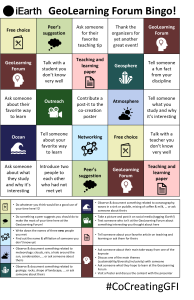 Make the most out of the GeoLearning Forum
Make the most out of the GeoLearning Forum
Read more about how to use bingos in teaching here: Glessmer, M.S., L. Latuta, F. Saltalamacchia, and K. Daae. 2023. Activity bingo: Nudging students to make the most out of fieldwork. Oceanography, https://doi.org/10.5670/oceanog.2023.217
Find pptx templates to make your own bingo here: https://cocreatinggfi.w.uib.no/bingo/
Fieldwork Bingo
Make the most out of your field work: Students often don’t know what to do in the field, and there may be a lot of waiting. By equipping students with an activity bingo, they can cover a range of activities that are encouraged, but not necessarily obvious for students to take part in during their fieldwork. (Pdf for download here)
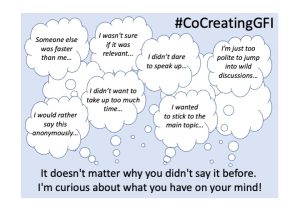 Uncover missing voices
Uncover missing voices
There are many reasons why interesting points never make it from participants’ heads into a discussion. You could ask for them in an anonymous online forum after class. That might surface interesting thoughts, as well as give students confidence that their input is valued, which makes it easier to speak up in class in the future. (Blogpost here, pdf for download here)
Our favourite feedback method
Asking what the teacher can “stop, continue, start” (Hoon et al., 2015) gives us formative feedback to improve our teaching. But what if we ask students the same question so they use the evaluation to reflect on and improve their own learning (Bovill, 2011)? (Pdf for download here)
Co-creating dictionaries
Students learn many new words and terms during a course. Try to create a shared dictionary resource. The teacher suggest words and terms, students can add their own terms, and students fill in explanations with their own words. The teacher can modify and accept the explanations at a set date before the exam preparations start. (Pdf for download here)

ReADi rounds to help students read and engage in discussions
Sometimes, it is difficult to motivate students to read in preparation for a class. The ReADi method uses question preparation before in-class discussions to facilitate reading and discussions. But this method can be adapted in many ways, including co-creating with the students. (Pdf for download here)
Read more here: Mirjam S. Glessmer, Catherine Bovill, and Kjersti Daae. 2024. Adapting a teaching method to fit purpose and context. Oceanography, https://doi.org/10.5670/oceanog.2024.603.

Find out how your students see the course. Improve it together!
A TAP (Teaching Analysis Poll) is a qualitative interim evaluation method for courses. Led by an external facilitator (e.g., staff, student), in the absence of the course instructor, students form small groups and have ~15min to discuss and fill out a form on:
A: Which aspects of the course facilitate your learning?
B: Which aspects of the course hinder your learning?
C: What suggestions do you have for improving the obstructive aspects?
The facilitator collects the forms, asks for clarification and for student support of statements (ca. 15 min). The facilitator and course instructor then meet to share and discuss the anonymised feedback (statements supported by majority of students). Pdf for download)
Read more about the method here: Hawelka, B. (2019). Coding Manual for Teaching Analysis Polls. Centre for University and Academic Teaching, Regensburg. https://www.uni-regensburg.de/assets/zentrum-hochschul-wissenschaftsdidaktik/forschung/manual-tap-2019.pdf
Photos from Colourbox.com

A jigsaw approach to field learning
Students plan the fieldwork in home groups (colors), participate in fieldwork on different days, and reconvene in home groups to process the fieldwork experience. During each fieldwork day, the students cooperate with students from other groups, helping and teaching each other about their jigsaw piece (topic). The groups also meet after each fieldwork day to reflect on how things worked, consult theory, and optimize their plans for retrieving quality data to answer their research question. You can read more about the method here. (Pdf for download here)
A version of this will appear in the book: Teaching Fieldwork in Geography, Earth and Environmental Sciences, By Editors D. France, L. Batty, and D. Swanton, Edward Elgar Publishing, in prep.

